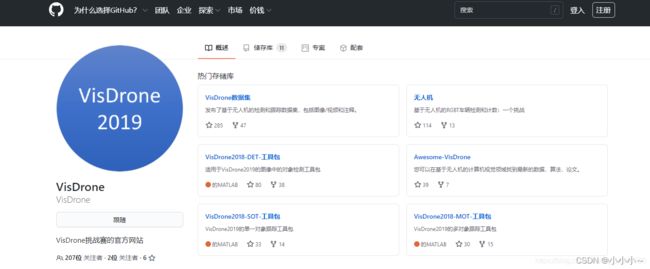visdrone2019数据集的处理
一、数据集下载
下载visdrone2019数据集,下面是github下载地址
https://github.com/VisDrone

下载完成后我们可以在Anootations看到txt文件,其中相关的数字解释如下:
![]()
<bbox_left>,<bbox_top>,<bbox_width>,<bbox_height>,<score>,<object_category>,<truncation>,<occlusion>
Name Description
-------------------------------------------------------------------------------------------------------------------------------
<bbox_left> The x coordinate of the top-left corner of the predicted bounding box
<bbox_top> The y coordinate of the top-left corner of the predicted object bounding box
<bbox_width> The width in pixels of the predicted object bounding box
<bbox_height> The height in pixels of the predicted object bounding box
<score> The score in the DETECTION file indicates the confidence of the predicted bounding box enclosing
an object instance.
The score in GROUNDTRUTH file is set to 1 or 0. 1 indicates the bounding box is considered in evaluation,
while 0 indicates the bounding box will be ignored.
<object_category> The object category indicates the type of annotated object, (i.e., ignored regions(0), pedestrian(1),
people(2), bicycle(3), car(4), van(5), truck(6), tricycle(7), awning-tricycle(8), bus(9), motor(10),
others(11))
<truncation> The score in the DETECTION result file should be set to the constant -1.
The score in the GROUNDTRUTH file indicates the degree of object parts appears outside a frame
(i.e., no truncation = 0 (truncation ratio 0%), and partial truncation = 1 (truncation ratio 1% ~ 50%)).
<occlusion> The score in the DETECTION file should be set to the constant -1.
The score in the GROUNDTRUTH file indicates the fraction of objects being occluded (i.e., no occlusion = 0
(occlusion ratio 0%), partial occlusion = 1 (occlusion ratio 1% ~ 50%), and heavy occlusion = 2
(occlusion ratio 50% ~ 100%)).
其中:两种有用的注释:truncation截断率,occlusion遮挡率。
被遮挡的对象比例来定义遮挡率。
截断率用于指示对象部分出现在框架外部的程度。
如果目标的截断率大于50%,则会在评估过程中将其跳过。
相关转换到voc的代码如下:
# coding: utf-8
"""
将annatations文件夹中的txt标签文件转换为XML文件;
txt标签内容为:
<bbox_left>,<bbox_top>,<bbox_width>,<bbox_height>,<score>,<object_category>,<truncation>,<occlusion>
类别:
ignored regions(0), pedestrian(1),
people(2), bicycle(3), car(4), van(5),
truck(6), tricycle(7), awning-tricycle(8),
bus(9), motor(10), others(11)
"""
import os
import cv2
import time
from xml.dom import minidom
name_dict = {'0': 'ignored regions', '1': 'pedestrian', '2': 'people',
'3': 'bicycle', '4': 'car', '5': 'van', '6': 'truck',
'7': 'tricycle', '8': 'awning-tricycle', '9': 'bus',
'10': 'motor', '11': 'others'}
def transfer_to_xml(pic, txt, file_name):
xml_save_path = 'xml' # 生成的xml文件存储的文件夹
if not os.path.exists(xml_save_path):
os.mkdir(xml_save_path)
img = cv2.imread(pic)
img_w = img.shape[1]
img_h = img.shape[0]
img_d = img.shape[2]
doc = minidom.Document()
annotation = doc.createElement("annotation")
doc.appendChild(annotation)
folder = doc.createElement('folder')
folder.appendChild(doc.createTextNode('visdrone'))
annotation.appendChild(folder)
filename = doc.createElement('filename')
filename.appendChild(doc.createTextNode(file_name))
annotation.appendChild(filename)
source = doc.createElement('source')
database = doc.createElement('database')
database.appendChild(doc.createTextNode("Unknown"))
source.appendChild(database)
annotation.appendChild(source)
size = doc.createElement('size')
width = doc.createElement('width')
width.appendChild(doc.createTextNode(str(img_w)))
size.appendChild(width)
height = doc.createElement('height')
height.appendChild(doc.createTextNode(str(img_h)))
size.appendChild(height)
depth = doc.createElement('depth')
depth.appendChild(doc.createTextNode(str(img_d)))
size.appendChild(depth)
annotation.appendChild(size)
segmented = doc.createElement('segmented')
segmented.appendChild(doc.createTextNode("0"))
annotation.appendChild(segmented)
with open(txt, 'r') as f:
lines = [f.readlines()]
for line in lines:
for boxes in line:
box = boxes.strip('\n')
box = box.split(',')
x_min = box[0]
y_min = box[1]
x_max = int(box[0]) + int(box[2])
y_max = int(box[1]) + int(box[3])
object_name = name_dict[box[5]]
# if object_name is 'ignored regions' or 'others':
# continue
object = doc.createElement('object')
nm = doc.createElement('name')
nm.appendChild(doc.createTextNode(object_name))
object.appendChild(nm)
pose = doc.createElement('pose')
pose.appendChild(doc.createTextNode("Unspecified"))
object.appendChild(pose)
truncated = doc.createElement('truncated')
truncated.appendChild(doc.createTextNode("1"))
object.appendChild(truncated)
difficult = doc.createElement('difficult')
difficult.appendChild(doc.createTextNode("0"))
object.appendChild(difficult)
bndbox = doc.createElement('bndbox')
xmin = doc.createElement('xmin')
xmin.appendChild(doc.createTextNode(x_min))
bndbox.appendChild(xmin)
ymin = doc.createElement('ymin')
ymin.appendChild(doc.createTextNode(y_min))
bndbox.appendChild(ymin)
xmax = doc.createElement('xmax')
xmax.appendChild(doc.createTextNode(str(x_max)))
bndbox.appendChild(xmax)
ymax = doc.createElement('ymax')
ymax.appendChild(doc.createTextNode(str(y_max)))
bndbox.appendChild(ymax)
object.appendChild(bndbox)
annotation.appendChild(object)
with open(os.path.join(xml_save_path, file_name + '.xml'), 'w') as x:
x.write(doc.toprettyxml())
x.close()
f.close()
if __name__ == '__main__':
t = time.time()
print('Transfer .txt to .xml...ing....')
txt_folder = 'annotations' # visdrone txt标签文件夹
txt_file = os.listdir(txt_folder)
img_folder = 'images' # visdrone 照片所在文件夹
for txt in txt_file:
txt_full_path = os.path.join(txt_folder, txt)
img_full_path = os.path.join(img_folder, txt.split('.')[0] + '.jpg')
try:
transfer_to_xml(img_full_path, txt_full_path, txt.split('.')[0])
except Exception as e:
print(e)
print("Transfer .txt to .XML sucessed. costed: {:.3f}s...".format(time.time() - t))